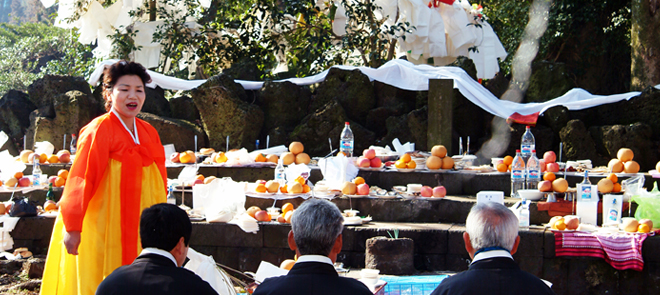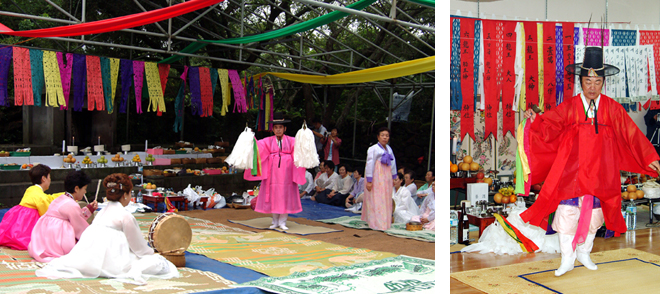Public enterprise working for the happiness of all through tourism, JTO
Jeju
HOME > Jeju > Folk of Jeju
Folk of Jeju
-

- Dang
- The female-oriented Shamanistic rituals, known as gut, are the opposite of the male-oriented Confucianist poje, and usually performed at dang, which are the homes of Jeju’s many gods and goddesses. The rituals continued until the present day because of their power to strengthen the unity of villagers and maintain community life. The common form of dang is a sanctified old tree, a rock cave or a huge rock. Dang for long have been taking care of the villages and the people of Jeju.
-

- Gut (Shamanistic rituals)
- Gut is the name given to the Shamanistic rituals through which Jeju residents have traditionally interacted with the island’s 18,000 gods and goddesses and asked them to intercede on their behalf. Through these rituals, the people deal with evil, corruption, sickness, death and other disorders in the world and ask for Gut were traditionally performed at village dang or shrines but the more important gut now take place in more public places, both to introduce them to more Jeju residents and to invite tourists and visitors to join the ceremony. One of the more important gut, the Tamnaguk Ipchungut, has been held around Feb. each year since the time of the Tamna Kingdom to mark the onset of spring (Ipchun is one of 24 seasonal divisions in the solar calendar). The rites held at this time ask the gods for a bountiful harvest and individuals also address their personal wishes for the year to come. There are many different types of gut for many different purposes and these ceremonies retain an important place in the everyday life of Jeju’s people, even in the bustle of modern life.
-
- Shingugan (Moving Season)
- On Jeju Island, there is traditionally only one moving period during the year called Shingugan. Legend has it that the gods report to the King of Heaven about the state of the world once a year, and based on their yearly performance; are assigned to a new place. During this period, Jeju people move so that the evil gods cannot find them. This period continues for a week that generally begins five days after Daehan (late January) and lasts until three days before Ipchun (early February). The saying goes that if you move outside of this period, you will have misfortune.
-
- Pojedan (Place for village festival)
- When males of the Jeju villages performed village festivals as per the Confucian rites, they called them poje and the places where the events are held are called pojedan. These sites are where Jeju-do people wish for peace for the village. The offerings given can vary depending on the number of gods considered to be present. In addition, approach it with and leave any Recently, village festivals, with the support of the villagers, cultural heritage





